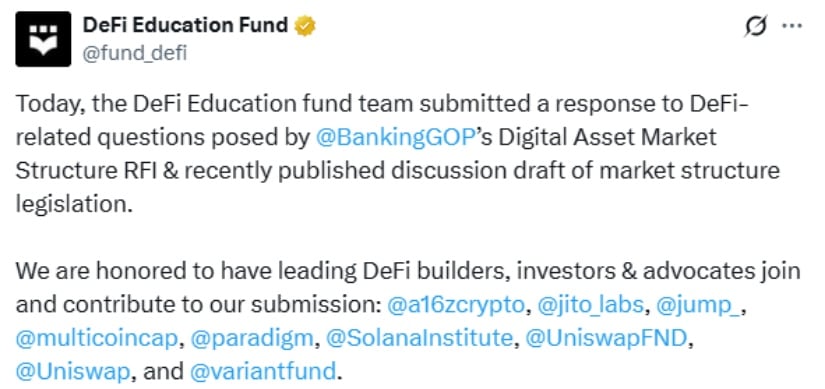DeFi Education Fund Pushes Senate for Stronger Developer Protections in New Crypto Bill
Major crypto companies are asking the US Senate to change how it plans to regulate digital finance.
The DeFi Education Fund, backed by big names like a16z Crypto, Uniswap Labs, and Paradigm, sent a letter to Senate leaders on August 2, 2025. They want stronger protections for crypto developers in a new bill called the Responsible Financial Innovation Act of 2025.
The letter goes to Senate Banking Committee Chairman Tim Scott and other key senators. It asks them to treat crypto developers differently from traditional financial companies. The group says the current draft bill could hurt innovation in the $141 billion decentralized finance industry.
What the DeFi Education Fund Wants
The crypto lobby group made four main requests. First, they want clear rules that separate DeFi developers from centralized middlemen like banks. Second, they need better definitions for who must register with the government. Third, they want standards to decide if a protocol is truly decentralized. Fourth, they’re asking for technology-neutral regulations.
The fund also wants federal law to override state regulations. They worry that big traditional banks might use different state laws to attack DeFi developers. “Well-resourced traditional financial institutions may exploit the fragmented regulatory landscape by funding or encouraging state-level enforcement actions against DeFi developers — not to protect consumers, but to stifle competition,” the group wrote.

Source: @fund_defi
The letter emphasizes that Americans should keep their right to control their own digital assets. This means people can hold their crypto without going through a bank or other company.
The New Senate Bill
The Senate Banking Committee released its discussion draft on July 22, 2025. This bill tries to create clear rules for digital assets in America. It builds on other crypto bills that Congress has been working on.
The Senate’s approach differs from what the House of Representatives passed earlier. The House gave most control over digital assets to the Commodity Futures Trading Commission. But the Senate wants a mixed system. The Securities and Exchange Commission would handle some parts while the CFTC manages others.
One big change in the Senate bill is a new category called “ancillary assets.” These digital tokens wouldn’t automatically count as securities under current law. This could make it easier for crypto projects to operate legally.
Developer Protection Concerns
The DeFi Education Fund specifically mentions the case of Roman Storm, a developer who worked on Tornado Cash. Storm faces criminal charges for his work on the privacy-focused crypto tool. The fund wants updated rules that make clear when someone is just writing code versus running a financial business.
“The rulemaking should reflect that technology that solely consists of non-custodial, non-controlling software shall not be regulated as a financial institution or financial intermediary,” the group stated in their letter.
This connects to broader worries in the crypto world. Many developers fear they could face legal trouble just for writing software. The DeFi Education Fund wants Congress to protect people who build decentralized tools but don’t control user funds.
Industry Response and Timeline
A16z Crypto sent its own separate response to the Senate committee. They worry the current bill could create dangerous loopholes that hurt investor protections. The venture capital firm wants different rules that focus on whether networks are truly decentralized.
The crypto industry has spent big money lobbying Congress this year. Companies spent nearly $7 million in the second quarter of 2025 trying to influence lawmakers. Coinbase alone spent close to $1 million on advocacy efforts.
Senator Tim Scott says lawmakers want to finish the crypto legislation by September 30, 2025. The committee is taking public comments through early August before writing the final version.
Both the House and Senate need to agree on crypto rules before sending anything to President Trump. The different approaches between chambers mean more negotiations are coming.
Broader Regulatory Context
This Senate bill is part of a bigger push to regulate crypto in America. Earlier this year, Congress passed the GENIUS Act, which created rules for stablecoins. The House also approved the CLARITY Act, though the Senate hasn’t voted on it yet.
The Trump administration has promised to be more friendly to crypto than previous governments. This has encouraged the industry to push for favorable rules while Republicans control Congress.
The new Senate bill also focuses heavily on stopping illegal financial activity. It creates working groups with law enforcement and intelligence agencies to study how criminals use digital assets. The goal is to stop bad actors while still allowing innovation.
What Happens Next
The Senate Banking Committee will review all the feedback they receive in August. Then they’ll write a final version of the bill for a committee vote. If it passes there, it goes to the full Senate for consideration.
Both supporters and critics agree that crypto needs better rules. The question is whether Congress can balance innovation with protecting consumers and preventing illegal activity. The DeFi Education Fund’s letter shows the industry wants to have a voice in writing those rules.
The outcome will affect millions of Americans who use crypto and the hundreds of companies building blockchain technology. With billions of dollars at stake, the pressure is on lawmakers to get it right.